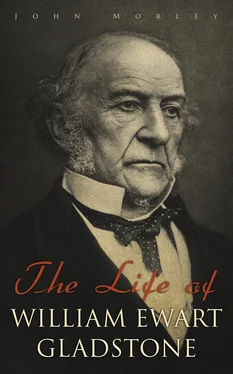All this was of no avail, just as the same arguments and temper on two other occasions of the same eternal theme in his life, 263were to be of no avail. Disraeli spoke strongly against the line taken by the Peelites. The second reading was carried by 438 against 95, one-third even of this minority being Irish catholics, and the rest mainly Peelites, 'a limited but accomplished school,' as Disraeli styled them. Hume asked Mr. Gladstone for his speech for publication to circulate among the dissenters who, he said, know nothing about religious liberty. It was something, however, to find Mr. Gladstone, the greatest living churchman, and Bright, the greatest living nonconformist, voting in the same lobby. The fight was stiff, and was kept up until the end of the summer. The weapon that had been forged in this blazing furnace by these clumsy armourers proved blunt and worthless; the law was from the first a dead letter, and it was struck out of the statute book in 1871 in Mr. Gladstone's own administration. 264
III
FALL OF THE RUSSELL GOVERNMENT
In the autumn (1851) a committee of the whig cabinet, now reinforced by the admission for the first time of Lord Granville, was named to prepare a reform bill. Palmerston, no friend to reform, fell into restive courses that finally upset the coach. The cabinet, early in November, settled that he should not receive Kossuth, and he complied; but he received a public deputation and an address complimenting him for his exertions on Kossuth's behalf. The court at this proceeding took lively offence, and the Queen requested the prime minister to ascertain the opinion of the cabinet upon it. Such an appeal by the sovereign from the minister to the cabinet was felt by them to be unconstitutional, and though they did not conceal from Palmerston their general dissatisfaction, they declined to adopt any resolution. Before the year ended Palmerston persisted in taking an unauthorised line of his own upon Napoleon's coup d'état (this time for once not on the side of freedom against despotism), and Lord John closed a correspondence between them by telling him that he could not advise the Queen to leave the seals of the foreign department any longer in his hands. This dismissal of Palmerston introduced a new element of disruption and confusion, for the fallen minister had plenty of friends. Lord Lansdowne was very uneasy about reform, and talked ominously about preferring to be a supporter rather than a member of the government; and whig dissensions, though less acute in type, threatened a perplexity as sharp in the way of a stable administration, as the discords among conservatives.
Lord John (Jan. 14, 1852) next asked his cabinet whether an offer should be made to Graham. A long discussion followed; whether Graham alone would do them any good; whether the Peelites, considering themselves as a party, might join, but would not consent to be absorbed; whether an offer to them was to be a persistent attempt in good faith or only a device to mend the parliamentary case, if the offer were made and refused. Two or three of the whig ministers, true to the church traditions of the caste, made great difficulties about the Puseyite notions of Newcastle and Mr. Gladstone. 'Gladstone,' writes one of them, 'is a Jesuit, and more Peelite than I believe was Peel himself.' In the end Lord John Russell and his men met parliament without any new support. Their tottering life was short, and it was an amendment moved by Palmerston (Feb. 20) on a clause in a militia bill, that slit the thread. The hostile majority was only eleven, but other perils lay pretty thick in front. The ministers resigned, and Lord Stanley, who had now become Earl of Derby, had no choice but to give his followers their chance. The experiment that seemed so impossible when Bentinck first tried it, of forming a new third party in the state, seemed up to this point to have prospered, and the protectionists had a definite existence. The ministers were nearly all new to public office, and seventeen of them were for the first time sworn of the privy council in a single day. One jest was that the cabinet consisted of three men and a half—Derby, Disraeli, St. Leonards, and a worthy fractional personage at the admiralty.
Sending to his wife at Hawarden a provisional list (Feb. 23), Mr. Gladstone doubts the way in which the offices were distributed:—'It is not good, as compared I mean with what it should have been. Disraeli could not have been worse placed than at the exchequer. Henley could not have been worse than at the board of trade. T. Baring, who would have been their best chancellor of the exchequer, seems to have declined. Herries would have been much better than Disraeli for that particular place. I suppose Lord Malmesbury is temporary foreign secretary, to hold the place for S. Canning. What does not appear on the face of the case is, who is to lead the House of Commons, and about that everybody seems to be in the dark....'
IV
FIRST DERBY ADMINISTRATION
The first Derby administration, thus formed and covering the year 1852, marks a highly interesting stage in Mr. Gladstone's career. 'The key to my position,' as he afterwards said, 'was that my opinions went one way, my lingering sympathies the other.' His opinions looked towards liberalism, his sympathies drew him to his first party. It was the Peelites who had now been thrown into the case of a dubious third party. At the end of February Mr. Gladstone sought Lord Aberdeen, looking 'to his weight, his prudence, and his kindliness of disposition as the main anchor of their section. His tone has usually been, during the last few years, that of anxiety to reunite the fragments and reconstruct the conservative party, but yesterday, particularly at the commencement of our conversation, he seemed to lean the other way; spoke kindly of Lord Derby and wished that he could be extricated from the company with which he is associated; said that though called a despot all his life, he himself had always been, and was now, friendly to a liberal policy. He did not, however, like the reform question in Lord John's hands; but he considered, I thought (and if so he differed from me), that on church questions we all might co-operate with him securely.' Mr. Gladstone, on the contrary, insisted that their duty plainly was to hold themselves clear and free from whig and Derbyite alike, so as to be prepared to take whatever of three courses might, after the defeat of protectionist proposals, seem most honourable—whether conservative reconstruction, or liberal conjunction, or Peelism single-handed. The last he described as their least natural position; for, he urged, they might be 'liberal in the sense of Peel, working out a liberal policy through the medium of the conservative party.' To that procrastinating view Mr. Gladstone stood tenaciously, and his course now is one of the multitudinous illustrations of his constant abhorrence of premature committal, and the taking of a second step before the first.
After Aberdeen he approached Graham, who proceeded to use language that seemed to point to his virtual return to his old friends of the liberal party, for the reader will not forget the striking circumstance that the new head of a conservative government, and the most trusted of the cabinet colleagues of Peel, had both of them begun official life in the reform ministry of Lord Grey. Graham said he had a very high opinion of Lord Derby's talents and character, and that Lord J. Russell had committed many errors, but that looking at the two as they stood, he thought that the opinions of Lord Derby as a whole were more dangerous to the country than those of Lord John. Mr. Gladstone said it did not appear to him that the question lay between these two; but Graham's reception of this remark implied a contrary opinion.
Lincoln, now Duke of Newcastle, he found obdurate in another direction, speaking with great asperity against Lord Derby and his party; he would make no vows as to junction, not even that he would not join Disraeli; but he thought this government must be opposed and overthrown; then those who led the charge against it would reap the reward; if the Peelites did not place themselves in a prominent position, others would. They had a further conversation. The duke told him that Beresford, the whip, had sent out orders to tory newspapers to run them down; that the same worthy had said 'The Peelites, let them go to hell.' Mr. Gladstone replied that Beresford's language was not a good test of the feelings of his party, and that his violence and that of other people was stimulated by what they imagined or heard of the Peelites. Newcastle persisted in his disbelief in the government. 'During this conversation, held on a sofa at the Carlton, we were rather warm; and I said to him, “It appears to me that you do not believe this party to be composed even of men of honour or of gentlemen.”... He clung to the idea that we were hereafter to form a party of our own, containing all the good elements of both parties. To which I replied, the country cannot be governed by a third or middle party unless it be for a time only, and on the whole I thought a liberal policy would be worked out with greater security to the country through the medium of the conservative party, and I thought a position like Peel's on the liberal side of that party preferable, comparing all advantages and disadvantages, to the conservative side of the liberal party. And when he spoke of the tories as the obstructive body I said not all of them—for instance Mr. Pitt, Mr. Canning, Mr. Huskisson, and in some degree Lord Londonderry and Lord Liverpool.'
Читать дальше









![William Frith - John Leech, His Life and Work. Vol. 1 [of 2]](/books/747171/william-frith-john-leech-his-life-and-work-vol-thumb.webp)


![William Frith - John Leech, His Life and Work, Vol. 2 [of 2]](/books/748201/william-frith-john-leech-his-life-and-work-vol-thumb.webp)